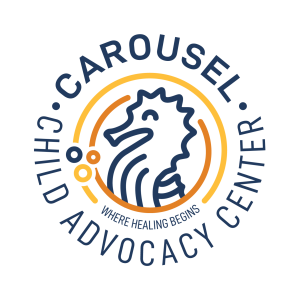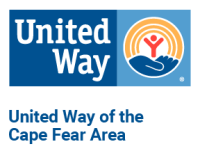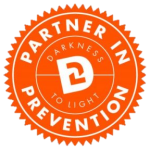What should I tell my child about coming to the Child Advocacy Center?
You might tell your child: “We are going to the Carousel Center. It is a special place where kids go to talk about important stuff. The person you will be talking to talks to many kids about what might have happened to them. It’s okay to tell them everything. You are not in any trouble.”
Who will my child talk to?
On their first visit, your child will talk to one of our trained interviewers and a medical provider. These professionals have attended advanced training on how to talk to children about complex subjects. It’s important that any details about the alleged abuse come from the child. Our interviewers are trained not to ask suggestive questions and to move at a comfortable pace for your child. They never force a child to talk to them.
What will I be doing while my child is talking to someone?
You will meet with your family advocate. They will answer any questions you have, listen to your worries and concerns, and provide resources to help you through this difficult time. Our advocates are not therapists, but they will listen and get you the help you need.
Your other children can play in our child-friendly waiting area while you talk privately with your advocate. Our volunteer greeters, staff assistant, or one of our interns will keep an eye on them. Before they find our snacks in our kitchen, be sure to let us know if your child(ren) has any food allergies or diet restrictions.
What happens after the interview?
You will be able to talk to members of the investigation team. They will tell you in general terms what they learned from the interview. You will have an opportunity to ask questions and voice your concerns.
Remember, your child’s interview is just the first step in the process. There may be other witnesses that need to be interviewed. There may be physical evidence that needs to be photographed or collected. The alleged offender will be interviewed. So, it’s often difficult to predict what will happen at this point in the process. All of the information will be turned over to the county attorney, who will decide whether or not to prosecute. Your family advocate will keep in regular contact to let you know what is happening in the case. If you have questions at any point during the investigation or prosecution of your child’s case, please feel free to contact your advocate.
Parents and children often worry about whether they must testify in court. It’s really way too early to know. If this happens, our advocate will be with you every step of the way and will even provide a special Court School to help your child feel more comfortable.
Child Medical Evaluation (CME) and Forensic Interview
Professionals with specialized training and education perform a child medical evaluation and forensic interview when there are potential concerns for abuse, neglect, or exposure to violence. The assessment includes a detailed history from a non-offending caregiver, a forensic interview, and a medical exam in a nurturing and supportive child-friendly environment.
A Forensic Interview is a structured conversation with a child using an evidence-based protocol – RADAR – Recognizing Abuse Disclosures And Responding—is a structured, child-friendly model for interviewing children and adolescents in cases of suspected child maltreatment. The purpose of the interview is to obtain a detailed history of the child’s experience to aid in medical diagnosis and assess the child’s overall health, well-being, and safety.
Child Medical Exam
The Child Medical Exam occurs at the Carousel Child Advocacy Center in a child-friendly examination room. Each child receives a thorough head-to-toe exam similar to a well-child exam. Our medical staff is rostered through the University of North Carolina Chapel Hill School of Medicine Child Medical Evaluation program.
Following the child’s evaluation, our multidisciplinary team will formulate recommendations regarding the child’s overall health and safety, which will be shared with the non-offending caregiver.
Will my child need counseling?
Some children do, and some don’t. Every child is unique in how they cope. Some may not need counseling now but will need counseling down the road. Maybe you need counseling more than your child to help you cope with everything that has happened. Your advocate will listen and provide referral information. What we do know is that children who are believed and protected from continued abuse can do quite well.
It is vital to your child’s recovery that you work with a therapist specifically trained and experienced in trauma and abuse. This is a field with particular expertise.
In most instances, providing your child with an opportunity to talk with a professional is crucial. Too often, parents want their child to “forget” about the abuse and “move on.” That’s easier said than done. Counseling can help your child and family through this challenging time. It’s best to address issues and concerns now rather than years later.
We have therapists available at the Carousel Center, or we can provide you with referrals to therapists in the community. Please call 910-254-9898 to request Therapy. Please know that if our therapist’s schedules are full, you may be referred to a community provider that provides Trauma Therapy.
How To Report Suspected Child Abuse
If you suspect that a child is being abused or neglected, or if you think a child may have died from being mistreated, the law requires you to report what you know to your county’s Department of Social Services.
- New Hanover County: 910-798-3400
- Brunswick County: 910-253-2077
- Pender County: 910-259-1240
If you believe a child is in imminent danger call 9-1-1 immediately.
Additional resources:
The Suicide Lifeline is 1-800-273-8255
Crisis Text Line – Text HOME to 741741
Trillium Screening Triage and Referral – 1-877-685-2415
Quick video overview of your visit to Carousel Child Advocacy Center



